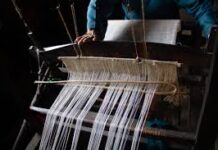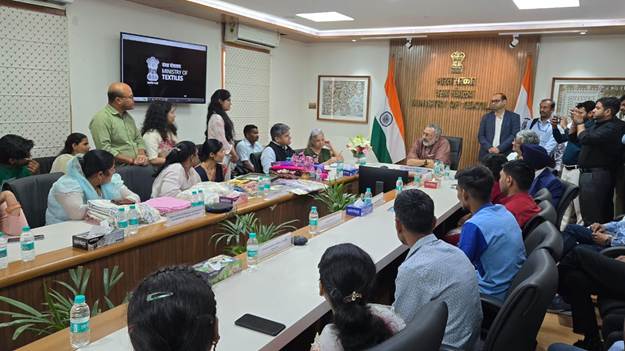MAY 24: Union Minister of Textiles, Shri Giriraj Singh, held an interactive session with beneficiaries and industry partners under the Samarth Scheme. The event witnessed active participation from representatives of key textile sub-sectors, including handloom, handicraft, jute, and silk. Beneficiaries shared their personal experiences and highlighted how the Samarth Scheme has positively impacted their livelihoods by equipping them with relevant skills and enhancing employment opportunities.
During the interaction, the Union Minister emphasized the critical role of the textile sector in India’s economy, especially as one of the largest employment-generating industries. He underlined the importance of government initiatives, such as the Samarth Scheme, in empowering the workforce and supporting the growth of the textile value chain.
Industry partners present at the event provided valuable feedback on the scheme’s current status. They discussed existing challenges, growth prospects, and the need to create more opportunities for skilled manpower. The representatives acknowledged the scheme’s success while urging continued efforts to modernize infrastructure, upgrade technology, and foster innovation—key to positioning India as a global textile hub.
Since its inception, the Samarth (Scheme for Capacity Building in the Textile Sector) has trained over 4.32 lakh beneficiaries, with 3.20 lakh individuals successfully placed in the organized textile and related sectors. Notably, 88% of the trained beneficiaries are women, underscoring the scheme’s significant contribution to gender-inclusive development. By empowering women in areas such as textile production, craftsmanship, and innovation, Samarth is helping to transform lives and strengthen communities.
The scheme operates nationwide, extending from Jammu & Kashmir to the Andaman & Nicobar Islands, ensuring that skill development reaches even the remotest regions. As a demand-driven, placement-oriented initiative, Samarth aims to support industry-led efforts in job creation while covering the entire textile value chain, excluding spinning and weaving.
The government’s focus on increasing textile manufacturing, modernizing sector infrastructure, and developing a highly skilled workforce reflects a clear vision to elevate India’s position as a global leader in textiles. Samarth stands as a vital pillar in achieving this vision, serving as a catalyst for sustainable employment and inclusive economic growth across the country.




















